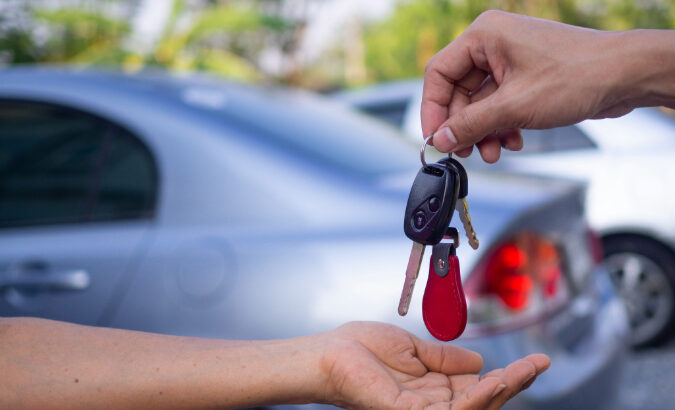
You may be debating whether to buy or lease if you’re in the market for a new car. It’s considered one of the most significant decisions most people will ever make, so it is essential to take your time and consider both choices from all angles. To help you with this milestone, we will explore the pros and cons of leasing vs. buying a car.
What is a car lease?
Leasing a car is like renting a car for a long-term contractual period. You are locked into the deal for a certain number of months and a monthly payment. Instead of paying a loan and building equity like you would if you purchased a car, you are paying for the car’s estimated depreciation during your lease. [1]
Is there a difference between financing and leasing a car?
The main difference between financing and leasing a car is the end result. When financing a car, you are borrowing money from a bank, finance company, or credit union to slowly purchase your car over a certain period of time. When leasing a car, you are paying for the right to use the vehicle for a defined amount of time and miles. The monthly payments on a lease are usually lower than the monthly payments if you bought the same car. When the lease ends, you must return the car unless the lease agreement lets you buy it. [2]
What happens after a car lease ends?
When your vehicle lease ends, you have three options. First, you can trade it in and replace your old lease with a new lease for a different car. If you don’t want to lease another vehicle or would rather buy your next vehicle, you can simply walk away. Finally, if you like the car you’ve been leasing, you can purchase it. The purchase price for the car will be listed in your lease agreement, so you can shop around and compare prices. As you near the end of your lease, you may start hearing from the dealership to find out how you want to proceed. Be sure to take your time to consider each option to find the right fit for you. [3]
Pros of leasing a car
Lower monthly payments
A lease can ease the financial burden of monthly costs due to the smaller down payment compared with buying. This could mean opting for a more luxurious car than you could otherwise afford.
Worry-free maintenance
Many cars come with a warranty that lasts at least three years, so many of the repairs may be covered in a 3-year lease.
No resale concerns
Because you’re only leasing, simply return the car at the end of the lease. Keep in mind you may have end-of-lease fees, including those for abnormal wear and tear or additional mileage on the car.
Freedom to drive a new car every few years
When your lease is up, you can return your car and get another new one. By leasing, you get the latest advances in car technology every few years. [4]
Cons of leasing a car
Mileage requirements
Most leases permit a certain amount of mileage on the car (typically 10,000 to 15,000 miles per year), and exceeding this mileage can result in fees.
Fees and other costs
While the monthly cost you pay for leasing a car is much lower, there are other fees that come with leasing a car. This includes fees for modifications to the car, excess wear and tear, an early termination fee if you terminate the lease early, an acquisition fee, and more.
Constant monthly payments
When your lease ends, you’ll need to start a new one, meaning you’ll always have a car payment. [4]
If you like always driving the latest models or don’t have the credit or money to buy a new car, leasing may be a smart option.
Pros of buying a car
Ownership
Whenever you have paid off your loan, the car is yours outright. You have the option to continue driving the car until it wears out, sell it to someone, or trade it into a car dealership for credit on another purchase.
Freedom to customize
You have complete control over how you improve or modify your car.
No restrictions
Unlike leasing a car, you’re not on the hook for excessive mileage or abnormal wear and tear fees. Because you own it, you pay for services and repairs on your timeline. [4]
Cons of buying a car
Higher monthly payments
If you lease your car, the monthly payments will typically be lower than new car payments for the same vehicle.
Rapid depreciation
New cars can lose 15% to 25% of their value in the first five years of ownership. [4]
Large down payment
If you want better odds of getting approved for a loan, you might want to offer a larger down payment. For example, a 20% down payment for a $25,000 car would be about $5,000. Leasing your vehicle would allow you to keep at least some of that upfront cash.
If you plan to keep your car for a long time, modify it or drive a lot of miles, it makes more sense to buy.
Things to consider when car shopping
Before deciding whether to buy or lease a new or used car, make sure to do your research, especially if it’s your first time buying a car. Some things to consider are your budget, each car’s safety features, the maintenance costs, and more.
What documents do I need to lease or buy a car?
When you go to the dealership to buy or lease a vehicle, here are the suggested documents to bring:
1. Valid driver’s license
2. Proof of residency (utility bill, bank statement, etc.)
3. Proof of income (pay stub) [5]
After considering all the pros and cons of buying or leasing a car and coming to your decision, don’t forget about insuring your vehicle with Nationwide.
Sources:
[1] “Car Leasing Guide: How to Lease a Vehicle,” Kelley Blue Book, kbb.com/car-advice/car-leasing-guide (July 8, 2022).
[2] “Financing or Leasing a Car,” consumer.ftc.gov/articles/financing-or-leasing-car (July, 2022).
[3] “The basics of a car lease agreement,” bankrate.com/loans/auto-loans/what-are-the-basic-elements-of-a-car-lease-agreement (Oct. 13, 2022).
[4] “Pros and Cons of Leasing or Buying a Car,” investopedia.com/articles/personal-finance/012715/when-leasing-car-better-buying.asp (Aug. 9, 2022).
[5] “What Documents Should I Have on Hand When Leasing a Car?” myautolux.com/blog/what-documents-should-i-have-on-hand-when-leasing-a-car (accessed Dec. 15, 2022).
Disclaimer:
The information included here is designed for informational purposes only. It is not legal, tax, financial or any other sort of advice, nor is it a substitute for such advice. The information may not apply to your specific situation. We have tried to make sure the information is accurate, but it could be outdated or even inaccurate in parts. It is the reader’s responsibility to comply with any applicable local, state or federal regulations. Nationwide Mutual Insurance Company, its affiliates and their employees make no warranties about the information nor guarantee of results, and they assume no liability in connection with the information provided. Nationwide and the Nationwide N and Eagle are service marks of Nationwide Mutual Insurance Company. © 2022 Nationwide



